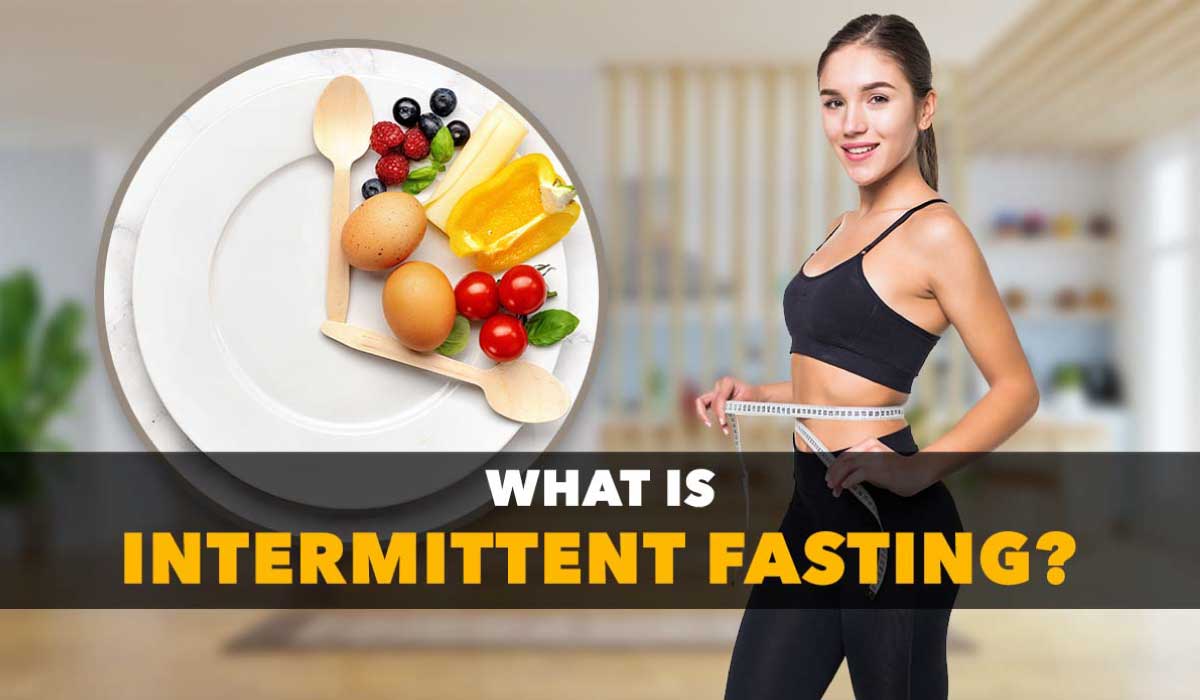Many people want to lose weight but don’t have time to go to a gym. So they try on different diet plans – which can affect their health adversely. You can lose weight without changing your diet just by doing intermittent fasting. So, if you want to know what is intermittent fasting- read on.
Contents
What is intermittent fasting?
The critical point here is not what you eat; it’s when you eat. The whole system runs around your eating pattern. Commonly intermittent fasting involves daily fasting for 16 hours out of the 24 hours, twice or even thrice every week. Fasting is a part of human evolution.
Our ancestors didn’t have refrigerators, markets, or even food supplies for the year. So they wouldn’t eat all their meals. As a result, we evolved to do our day-to-day work without having food for an extended period.
Fasting regularly has health benefits, and it is more natural than eating all our daily meals. Fasting is also associated with different religions, such as Hinduism, Islam, Christianity, Jainism, and Buddhism. (Source)
Intermittent fasting meal plans
Fasting has many forms. Here are some methods of intermittent fasting.
Intermittent fasting 12 hours
It is as simple as its name goes. You have to decide which 12 hours period you will fast and then stick to it. According to research, fasting for 16 hours will help the body turn fats into energy. It is infusing ketones into your bloodstream, aiding in weight loss.
This fasting plan is perfect for beginners as the fasting period is minimal, and the more significant chunk of it happens while you are asleep. You can have a regular amount of calories intake every day. The best way to follow the 12 hours of fasting is to include the time you sleep in the fasting period.
For example, you can choose to fast between 7 p.m. and 7 a.m. But you would have to finish your dinner before it’s 7 p.m. and don’t eat anything until after 7 a.m., but you would be asleep for most of the time in between. (Source)

Intermittent fasting meal plan for 16 hours
Fasting for 16 hours a day? Yes, that is right. With this plan, there are only 8 hours to eat. This is called a 16:8 method or else known as the Leangains diet. If you are a man, you fast for 16 hours. A woman, then 14 hours every day.
If you have tried the 12 hours fasting and it hasn’t affected you, then go ahead with the 16:8 method. You should have finished your dinner by 8 p.m. and will have yourself skipping breakfast every morning, eating until the afternoon.
A study shows that eating only for 8 hours will help you resist inflammation, obesity, liver disease, and diabetes even if you have calories you want to eat. (Source)
Fasting for two days a week
If you follow the 5:2 methods, keep your calorie intake of the healthy food regular for five days a week and reduce the calorie intake on two selected days of the week. During this fasting period, a man will take 600 calories, and a woman takes 500 calories.
Most people separate their fasting days in a week. For example, many people fast on Tuesday and Saturday and normally eat throughout the week.
There should be at least one non-fasting day in between the fasting. Research shows that the 5:2 method, also known as the fast diet around the world.
Research also shows that not getting calories twice a week and not getting calories for a continuous span of two days have a similar effect on weight loss. It also reduced insulin levels and strengthened insulin sensitivity among participants. (Source)
Alternate day fasting
Alternate day fasting has many variants, but the meaning is the same; fasting every other day. People tend to avoid solid foods on their fasting days altogether, while some will have 500 or up to 600 calories intake.
On a typical feeding day, you may eat whatever you want and how much ever you want. A study shows that alternate-day fasting is very efficient for heart health and weight loss in an overweight adult and a healthy adult.
Alternate day fasting is challenging in all intermittent fasting methods, so those with prior medical conditions and beginners are not recommended to practice it. (Source)

Weekly 24-hours fast
Fasting straight for 24 hours or 36 hours in a week is also known as the eat-stop-eat diet. This means not eating any solid food for 24 hours at a time. People prefer to fast from lunch to lunch or breakfast for breakfast.
During fasting, you can have water, tea, and calorie-free drinks. As soon as the fasting is over, people should return to their regular calorie intake.
This method reduces the total calorie intake of a person but does not stop them from eating anything. Twenty-four hours of fasting is an overall challenge, can cause headaches, irritability, and significant fatigue.
People have found out that effects reduce as the body adjusts to the new pattern with passing the time. It is recommended to try 12 hours or 16 hours fasting than jumping directly onto 24 hours of fasting. (Source)
Meal skipping
This type of intermittent fasting is also known to be suitable for beginners. You have to skip meals from time to time. Apart from this, you can decide which meals you want to bypass as it depends on your hunger and time restrictions.
You cannot just eat anything. The food must be healthy for each meal you eat. It will be very successful if you monitor your body’s hunger and respond accordingly.
You will be eating when you are hungry and skipping the meal when you are not. Meal skipping is a more natural way of fasting. (Source)
The Warrior Diet
The warriors’ diet is one of the most extreme fastings in the list of intermittent fasting. While on this diet, a person has to eat very little as possible, mostly just a few fruits and vegetables, while fasting for 20 hours and then eating a large meal at night.
The eating period is only for 4 hours. This type of fasting can only be done by those who have tried other types of intermittent fasting.
There is a myth around the warriors fasting that humans are nocturnal eaters, and your body gains more nutrients in the night.
People should heavily eat vegetables; consume proteins and only healthy fats, with some carbohydrates.
People may eat food sometimes when on their fasting period because it can be challenging to follow the strict rules and regulations on when and what to eat, considering the consequences of extended teams.
People struggle to eat such a huge meal just before going to sleep. With the added risk of people not getting sufficient nutrients like fiber, this may negatively affect the digestive and immune systems, risking leading up to cancer. (Source)

Intermittent fasting benefits
Intermittent fasting has a lot of health benefits. Here are some benefits of intermittent fasting.
Reduces blood pressure
Intermittent fasting helps you to lower your blood pressure in the short run. The fasting method of 16:8 vastly reduces the blood pressure more than those that don’t have a specific eating period.
Having stable blood pressure is very important. Unstable blood pressure can increase your risk of heart diseases, heart attacks, and kidney-related problems.
The blood pressure will only remain stable only if you continue with intermittent fasting. Once you have ended the fasting, your blood pressure will go back to the initial levels before fasting. (Source)
Lower cholesterol
Alternate day fasting has proven to help lower total cholesterol and LDL cholesterol when done daily. LDL cholesterol is the reason for my heart disease or heart attacks.
It is also known as bad cholesterol. Intermittent fasting reduces the number of triglycerides in your body. Triglycerides are fat found in the bloodstream, leading to heart attack, stroke, or heart disease. (Source)
Boosted brain function
Intermittent fasting may improve mental sharpness and concentration. It will also protect your brain from the decline in memory as humans tend to get older.
It can strengthen the hippocampus’s connection capability and defend it from amyloid plaques found in the patient with Alzheimer. (Source)
Increases cell turnover
Intermittent fasting helps your body by giving it time to rest, which speeds up autophagy. It’s a critical detoxification function in the body that cleans out the damaged cells.
It is offering a chance to your body to remove all bad cells that accelerate the aging process. Eating between 8 a.m. to 2 p.m. increases the working period of the autophagy gene LC3A and the protein mTOR that controls the cell growth. (Source)
Lowers the risk of cardiovascular issues
Intermittent fasting can reduce insulin levels, and when they fall, so do the chances of life-threatening cardiovascular diseases. For example, congestive heart failure is significant for people who have type 2 diabetes as they have 3 to 4 times more chances of dying of heart disease than those who don’t have diabetes. (Source)
Better sleep at night.
Intermittent fasting can help you sleep better because it will have an impact on your eating habits. Intermittent fasting regulates circadian rhythm that also determines sleeping patterns. A regular sleeping pattern means you will fall asleep instantly and wake up feeling better.
Having your last meal early in the evening means you will have digested your meal before bed. Because digestion works well when you’re awake, sleeping with a full stomach can have acid reflux or heartburn, making it hard to sleep. (Source)
Intermittent fasting for weight loss
People start intermittent fasting just to lose weight. And it seems to be accurate, at the least, in the short term. Intermittent fasting of every type will result in weight loss. It can help you lose 1.3kg in two weeks and 8 kilograms in eight weeks. This means it’s good news for those who want to lose weight. (Source)
Reduced inflammation
The help of intermittent fasting and other calorie restrictions can reduce inflammation levels. For example, during Ramadan, this involves fasting from sunrise to sunset and only eating in the night.
The inflammatory levels remain low in Muslim people, so do their blood pressure, body weight, and body fats. (Source)
Increased chances for stroke survivors
Better cholesterol levels and low blood pressure play a significant role in the reduction of heart stroke.
Not to mention, this is not the only thing intermittent fasting can protect you from. The decrease in calories, in general, helps the body with building a protective mechanism for the brain.
In a scenario, if you may get a stroke and your brain will be protected from the injury. (Source)
Protection from cancer
Alternate fasting can help you by reducing the chances of getting cancer. It stops the development of Lymphoma, limiting tumor survival, and decelerating the spread of cancer cells. (Source)
Reduces insulin level
Intermittent fasting helps to stabilize blood sugar levels in people with diabetes as it resets insulin. Restricting calories will improve insulin resistance, which is a marker for type 2 diabetes. Intermittent fasting helps the insulin levels to fall, reducing the risk of type 2 diabetes. The best approach has been 16:8 fasting. (Source)
Dietitians suggest that people with diabetes should carefully implement intermittent fasting. People with specific medications for type 2 diabetes or on insulin can have low blood sugar levels, life-threatening. (Source)
Increase in a lifetime
A study shows that intermittent fasting can extend your lifetime. Because fasting can help you build up a resistance to age-related diseases. (Source)

Intermittent fasting side effects
Intermittent fasting can make you sick.
The fasting period’s length is significant; it can make you have headaches, crankiness, lethargy, and constipation.
To make you feel better and cut down the side effects, you can switch from Alternate-day fasting to periodic fasting or a timely eating plan through which you can eat the whole day within a certain period.
Intermittent fasting can cause the body to overheat.
When deprived of food, the hunger in the brain reacts by sending your body into overdrive, setting your body to overeat and pushing it to the limits. Humans have a nature for rewarding themselves after completing a challenging task, such as fasting for an extended period or even exercising for a long duration.
People might start eating unhealthy food or junk food on their non-fasting days. A study found that two common side effects of a calorie-restricted diet are slow metabolism and increased appetite, which also happens when people practice intermittent fasting as they cut calories every day.
Time-restricted eating can misalign a person’s circadian rhythm (your body’s natural cycle), leading to metabolic trouble. (Source)
Conclusion
The most significant difference between fasting and diet is that diets can complicate your life. Intermittent fasting may simplify it. Fasting saves a lot of time, while diets just eat up your time. Diet depends on region to region around the world, while fasting is available anywhere in this world.
Frequently Asked Questions
What can I drink during intermittent fasting?
Drinking water, coffee, tea, and other zero-calorie beverages during the fast are okay, and these drinks can help you reduce your hunger.u003cbru003eIs Intermittent Fasting Healthy?u003cbru003eIntermittent fasting is safe for everyone, except for those people who are on medication or woman who is pregnant or recently undergone childbirth. If you have gastroesophageal reflux, diabetes, kidney stones, or other medical problems, talk with your doctor about intermittent fasting before starting it.
Does sleeping count as fasting?
The easiest way of doing 12-hour fasting is to include the period of sleep in the fasting period. For example, a person could choose to fast between 7 p.m. and 7 a.m. They would need to finish their dinner before 7 p.m. and wait until 7 a.m. to eat breakfast but would be asleep for much of the time in between.
What can I have while intermittent fasting?
No solid food is allowed during the fasting period, but you can drink water, tea, coffee, and other non-caloric beverages.u003cbru003eSome types of intermittent fasting allow small amounts of low-calorie foods during the fasting period. Taking supplements is generally allowed while fasting, as long as they have zero calories in them.


